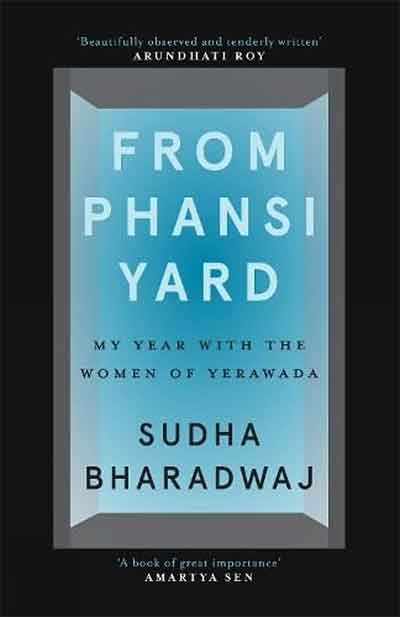The reading by Ratna Pathak Shah last evening from Sudha Bharadwaj’s book about days in the death row in jail, reminded me of a thrilling Marathi play Thank You Mr Glaad about a Naxalite revolutionary. The movement has taken little note of the play written by Anil Barve.It was also a big popular hit and was produced by Prabhakar Panshikar, a very popular actor and producer, in the 1970s.

Sudha, the lawyer and activist, spent three years and three months in jail following her arrest under the Unlawful Activities (Prevention) Act on August 28, 2018. Her book From Phansi Yard is about her days in Pune’s Yerawada Jail.
Barve was a brilliant playwright, novelist, journalist, fired by idealism who in today’s terms could be called an organic intellectual. His play is about Dr Birbhushan Patnaik, a doctor turned Naxalite, his unflinching commitment. He is pitted against a harsh Anglo Indian jailor Glaad whose wife had died in a concentration camp in Germany. Hours before his hanging he performs a successful ceasarian operation on Gladd’s daughter when no other medical help is available on the rainy night.
Some thought it was melodramatic, but it was certainly powerful and is still performed in other languages. Look at the multiple strands woven into the theme from fascism, revolution to humanism and so on.
Barve’s memory was also revived last week in a touching tribute by his very talented dancer choreographer daughter Phulwa Khamkar on his death anniversary. He died 39 years ago when she was barely nine year old and he 36. Liquor consumed this wonderful, pleasant, talented . man. And so prolific and talented. There was a large, warm response on facebok to her heartfelt remembrance. His premature death was a big blow to her young mind and she had for some time stopped thinking about him but today as she looks back, she realises what an important man he was. Talented film maker Rahi Barve is her brother. Her mother Prerana is the daughter of the famed Amar Shaikh, who roused thousands with his stirring revolutionary folk songs.
Coming back to trade unionist Bharadwaj, she has seen police heavy-handedness up close, but she did “not envisage the kind of thing” that happened to her as a suspect in the Bhima Koregaon case.
She wrote in her book – Some prisoners pray, some weep, some just put down their heads and work themselves weary. Sudha Bharadwaj watched through the bars of her cell, and she wrote. This is her remarkably granular account of the world of women prisoners in Yerawada Jail in Pune.Bharadwaj was incarcerated here, in a high-security wing called PhansiYard, from November 2018 to February 2020. She takes us through jail life, her own and the other women’s, from one season to the next, weaving in lively portraits of her fellow prisoners, their children and even their pets, and reflecting on everything from absurd rules, caste hierarchies, food, fistfights and friendships to the dismal absence of legal aid for the most defenceless of women.
While Bharadwaj is an unflinching observer of the harshness of prison life, this is not a bleak book. It is written with warmth, compassion and impish humour. It is Bharadwaj’s tribute to the women around her who showed her ‘every single day ‘, she says, ‘how to survive injustice, how to remain hopeful . . . how to continue to live, love, fight and laugh, even behind bars, as an observer put it.
The reading from he book last evening was followed by a talk by journalist Sukanya Shantha based on her expeience of covering of court proceedings in the trials of political prisoners, followed by senior journalist Freny Maneshaw’s conversation with Sudha. The programme oganised by PUCL, People’s Union for Civil Liberties, was ably compered by Geeta Seshu, journalist and feminist, media analyst. Her partner M.J. Pandey,my former colleague in TOI, needs to be more visible and heard considering the work he has done for the cause of journalists and few have such ideological grasp.
As for Barve I have another reason to remember him. He edited a lively weekly Ranangan in which P.V. Ranade, my history scholar maternal uncle, wrote an article on Shivaji in 1974, the 300th year f the coronation of Shivaji. It was respectful and analytical but it created quite a poliial storm in Maharashtra and he lost his job as a history lecturer in Marathwada university, now named after Dr Ambedkar. It is a landmark case of the persecution of an intellectual.
Barve was jailed for more than a year for suspected Naxalite activities He was a very active, committed journalist and wrote on the Chasnala mining disaster based on his visit there. It is necessary to remember writers like Barve, especially as the Marathi natya sammelan in its 100th year is being held in several centres with a substantial grant of Rs nine core from the Mahaashtra government. It must be used wisely, publishing some meaningful writing on Marathi as well as Indian theatre. Ostentatious expenses on pandals and VIP culure must be curbed. With Dr Jabbar Patel as the president of the 100th sammelan , truly serious and meaningful approach to various issues would be in order.
Vidyadhar Date is a senior journalist, culture critic and author of a book on public transport

















































